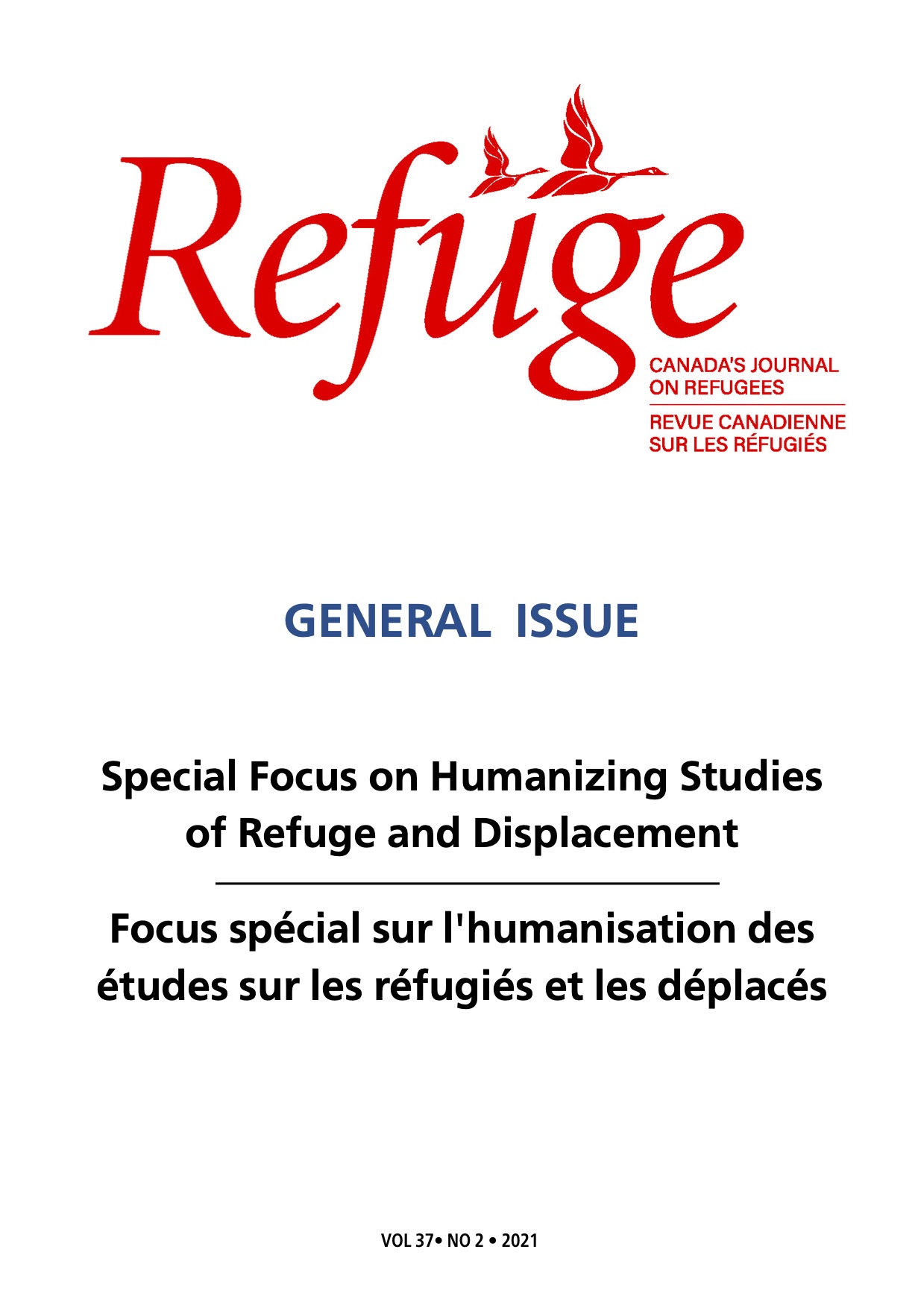Humanizing Refugee Research in a Turbulent World
DOI :
https://doi.org/10.25071/1920-7336.40795Mots-clés :
refugee research, humanizing research, dehumanization, policy, categorizationRésumé
Cet essai adopte une perspective critique à l’égard de l’idée d’humaniser la recherche sur les réfugiés. Il soutient qu’une grande partie de la recherche en sciences sociales est intrinsèquement déshumanisante en ce qu’elle simplifie et réduit l’expérience humaine à des catégories et des modèles se prêtant à l’analyse. Les tentatives d’humaniser la recherche peuvent efficacement remettre en question et déstabiliser les structures hégémoniques puissantes et dominantes qui encadrent les politiques publiques et la recherche sur la migration forcée. Par contre, elle pourrait les remplacer par de nouveaux cadres de recherche, désormais imprégnés d’autorité comme représentant des expériences plus authentiques ou plus proches de réalités vécues. Plutôt que de revendiquer une position de supériorité morale en humanisant la recherche, une ambition plus restreinte, et peut-être plus honnête, serait de reconnaître que la déshumanisation est inévitable dans la recherche sur les réfugiés et de chercher à déshumaniser autrement.
Statistiques
Références
Bakewell, O. (2008). Research beyond the categories: The importance of policy irrelevant research into forced migration. Journal of Refugee Studies, 21(4), 432–453. https://doi.org/10.1093/jrs/fen042
Brubaker, R. (2013). Categories of analysis and categories of practice: A note on the study of Muslims in European countries of immigration. Ethnic and Racial Studies, 36(1), 1–8. https://doi.org/10.1080/01419870.2012.729674
Cole, G. (2021). Sampling on the dependent variable: An Achille’s Heel of research on displacement? Journal of Refugee Studies, Article feaa123. https://doi.org/10.1093/jrs/feaa123
Crawley, H., & Skleparis, D. (2018). Refugees, migrants, neither, both: Categorical fetishism and the politics of bounding in Europe’s “migration crisis.” Journal of Ethnic and Migration Studies, 44(1), 48–64. https://doi.org/10.1080/1369183X.2017.1348224
Dahinden, J., Fischer, C., & Menet, J. (2021). Knowledge production, reflexivity, and the use of categories in migration studies: Tackling challenges in the field. Ethnic and Racial Studies, 44(4), 535–554. https://doi.org/10.1080/01419870.2020.1752926
Gatrell, P. (2019). The unsettling of Europe: The great migration, 1945 to the present. Allen Lane.
Gonzalez Benson, O., Temprosa, F. T., & Shlebah, S. (2020). From policy irrelevance to a return to relevance: Active strategies in forced migration research. Refugee Review, 4(1), 69–83. https://espminetwork.com/wp-content/uploads/2020/06/Benson-Temprosa-and-Shlebah.pdf
Humanising Studies of Refuge and Displacement. (2018, 9 November). Oxford Talks. School of Geography and the Environment, University of Oxford. https://talks.ox.ac.uk/talks/id/1002227d-9e39-4a40-9a81-6a2d06135af3/
Lee, C. S. (2019). Datafication, dataveillance, and the social credit system as China’s new normal. Online Information Review, 43(6), 952–970. https://doi.org/10.1108/OIR-08-2018-0231
Muiruri, P. (2021, April 30). Kenya delays closure of camps housing half a million people. The Guardian. https://www.theguardian.com/global-development/2021/apr/30/kenya-delays-closure-of-camps-housing-half-a-million-people
Nguyen, V. (2019). Refugeetude: When does a refugee stop being a refugee. Social Text, 37(2), 109–131. https://doi.org/10.1215/01642472-7371003
Sözer, H. (2019). Categories that blind us, categories that bind them: The deployment of vulnerability notion for Syrian refugees in Turkey. Journal of Refugee Studies, Article fez020. https://doi.org/10.1093/jrs/fez020
Sturridge, C., Bakewell, O., & Hammond, L. (2018, June). Return and (re)Integration after displacement: Belonging, labelling and livelihoods in three Somali cities. Research and Evidence Facility: EU Trust Fund for Africa (Horn of Africa Window). https://blogs.soas.ac.uk/ref-hornresearch/files/2020/02/Return-and-ReIntegration.pdf
Tometten, C. (2018). Resettlement, humanitarian admission, and family reunion: The intricacies of Germany’s legal entry regimes for Syrian refugees. Refugee Survey Quarterly, 37(2), 187–203. https://doi.org/10.1093/rsq/hdy002
Will, A.-K. (2018). On “genuine” and “illegitimate” refugees: New boundaries drawn by discriminatory legislation and practice in the field of humanitarian reception in Germany. Migration, Boundaries and Differentiated Citizenship, 6(3), 172–189. https://doi.org/10.17645/si.v6i3.1506
Wood, G. (1985). The politics of development policy labelling. Development and Change, 16(3), 347–373. https://doi.org/10.1111/j.1467-7660.1985.tb00214.x
Zetter, R. (1991). Labelling refugees: Forming and transforming a bureaucratic identity. Journal of Refugee Studies, 4(1), 39–62. https://doi.org/10.1093/jrs/4.1.39
Zetter, R. (2007). More labels, fewer refugees: Remaking the refugee label in an era of globalization. Journal of Refugee Studies, 20(2), 172–192. https://doi.org/10.1093/jrs/fem011
Téléchargements
Publié-e
Versions
- 2021-11-22 (2)
- 2021-11-22 (1)
Comment citer
Numéro
Rubrique
Licence
© Oliver Bakewell 2021

Cette œuvre est sous licence Creative Commons Attribution - Pas d'Utilisation Commerciale 4.0 International.
Les auteurs qui publient dans Refuge conservent le droit d’auteur associé à leur œuvre, et octroient au public une licence Creative Commons Attribution - Utilisation non commerciale 4.0 International. La licence permet l’utilisation, la reproduction et l’adaptation du matériel avec attribution par tous moyens et sous tous formats pour des fins non commerciales. Pour des informations générales sur les licences Creative Commons, visitez le site Creative Commons. Pour la licence CC BY-NC 4.0, consultez le résumé lisible par l'homme.







